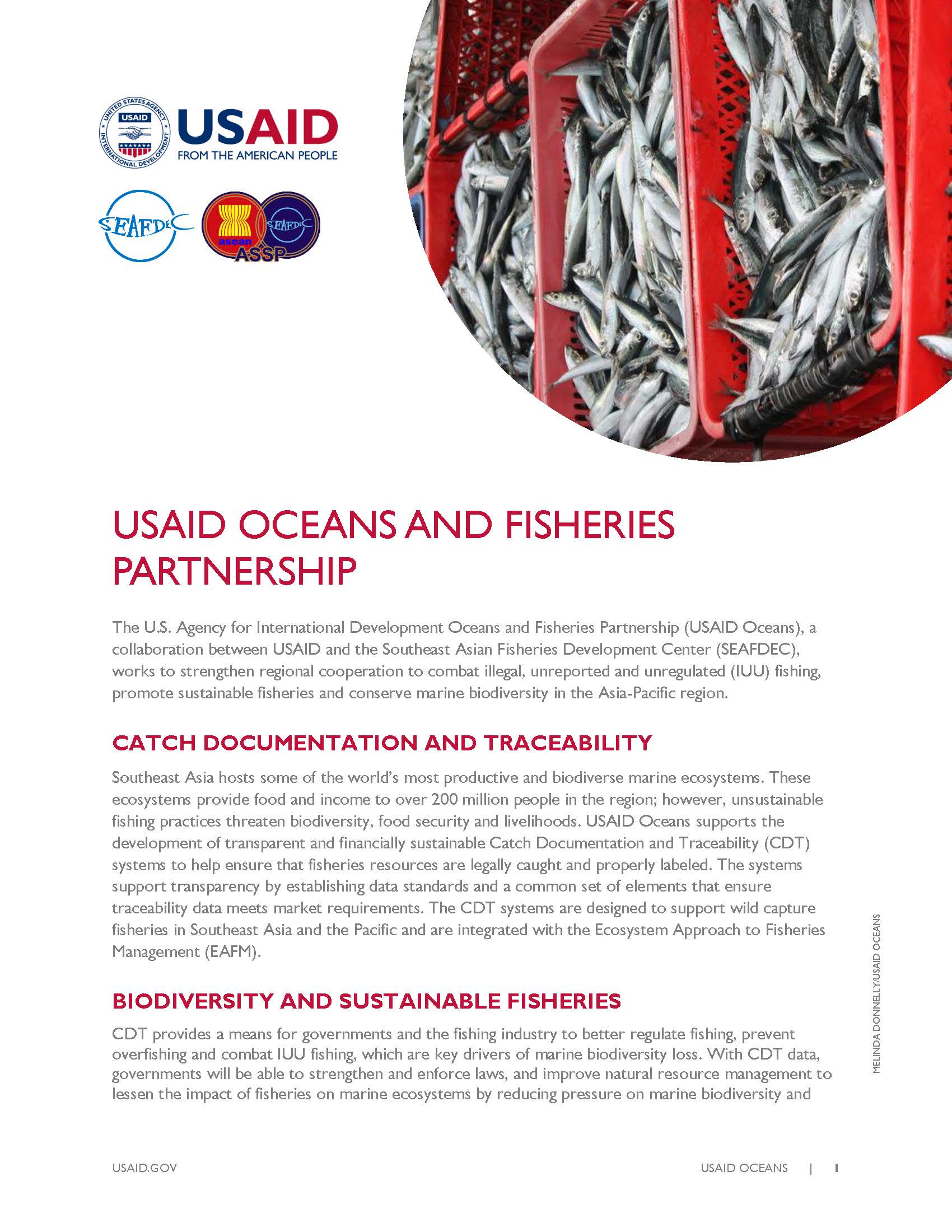The U.S. Agency for International Development Oceans and Fisheries Partnership (USAID Oceans), a collaboration between USAID and the Southeast Asian Fisheries Development Center (SEAFDEC), works to strengthen regional cooperation to combat illegal, unreported and unregulated (IUU) fishing, promote sustainable fisheries and conserve marine biodiversity in the Asia-Pacific region.
USAID OCEANS AND FISHERIES PARTNERSHIP ![]() (pdf - 300k)
(pdf - 300k)
CATCH DOCUMENTATION AND TRACEABILITY
Southeast Asia hosts some of the world’s most productive and biodiverse marine ecosystems. These ecosystems provide food and income to over 200 million people in the region; however, unsustainable fishing practices threaten biodiversity, food security and livelihoods. USAID Oceans supports the development of transparent and financially sustainable Catch Documentation and Traceability (CDT) systems to help ensure that fisheries resources are legally caught and properly labeled. The systems support transparency by establishing data standards and a common set of elements that ensure traceability data meets market requirements. The CDT systems are designed to support wild capture fisheries in Southeast Asia and the Pacific and are integrated with the Ecosystem Approach to Fisheries Management (EAFM).
BIODIVERSITY AND SUSTAINABLE FISHERIES
CDT provides a means for governments and the fishing industry to better regulate fishing, prevent overfishing and combat IUU fishing, which are key drivers of marine biodiversity loss. With CDT data, governments will be able to strengthen and enforce laws, and improve natural resource management to lessen the impact of fisheries on marine ecosystems by reducing pressure on marine biodiversity and strengthening biodiversity conservation efforts. The partnership also provides guidance in harmonizing regulatory policies and develops updated fisheries management plans that build off in-depth field research and catch documentation data.
PUBLIC-PRIVATE PARTNERSHIPS AND INVESTMENT
To improve transparency in the seafood supply chain and help ensure successful and sustainable solutions, USAID Oceans engages a variety of fisheries stakeholders, building new partnerships among governments, regional institutions and the private sector. The partnership works to leverage private sector investment to increase the impact of CDT systems and marine conservation efforts in the Asia-Pacific region.
HUMAN WELFARE AND GENDER
The fisheries sector has received much attention for its negative impacts on human welfare. Poor working conditions are perpetuated by IUU fishing. USAID Oceans seeks to improve human welfare, gender equity and gender equality throughout its CDT systems and all program initiatives. USAID Oceans further aims to provide guidance to regional partners on best practices in labor.
IMPACT AND RESULTS
USAID Oceans has identified two demonstration sites in General Santos City, Philippines and Bitung, Indonesia to pilot the CDT system development, implementation and testing. At both learning sites, USAID Oceans conducted assessments to identify the main export markets and an in-depth analysis to support EAFM plan development and human welfare interventions. The project has identified the CDT requirements of different stakeholders and engaged the private sector to implement traceability and ensure a financially sustainable CDT system. Visit seafdec-oceanspartnership.org/resources to access the technical summaries.
PARTNERS
USAID Oceans is an activity of USAID’s Regional Development Mission for Asia and is implemented by TetraTech ARD, in partnership with the Southeast Asian Fisheries Development Center (SEAFDEC). SEAFDEC is the technical and operational arm for fisheries matters in the region, and is engaged in the ASEAN-SEAFDEC Strategic Partnership (ASSP). ASSP works to enhance cooperation between ASEAN, SEAFDEC and its member countries and has recognized USAID Oceans as an official ASSP program. Other partners include the Coral Triangle Initiative for Coral Reefs, Fisheries and Food Security (CTI-CFF) as well as a wide range of global, regional, national and local partners to bolster the capacity for and implementation of CDT systems. USAID Oceans works in partnership with the Government of the Philippines and Government of Indonesia to implement and test CDT systems in the program learning sites. For a full list of USAID Oceans’ partners, visit seafdec-oceanspartnership.org/partners.
Click here for the pdf file.








Comment
Make a general inquiry or suggest an improvement.